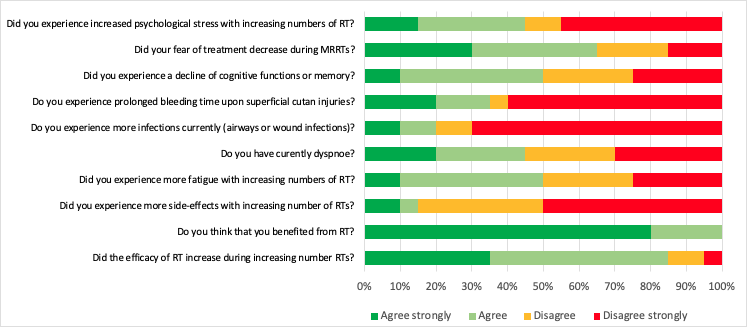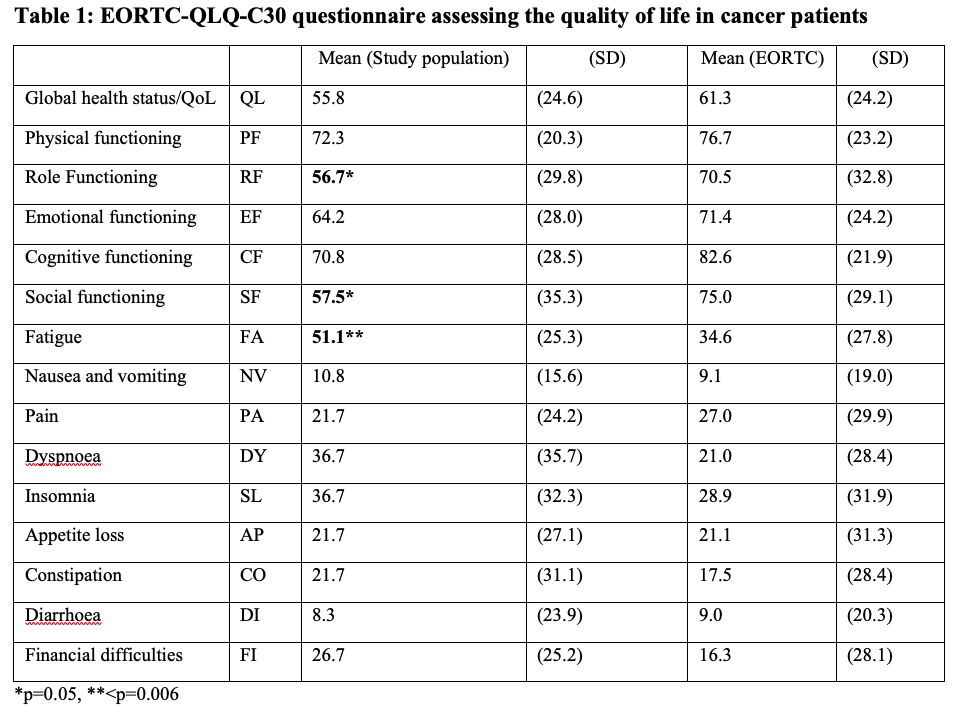Quality-of-life and perceptions in cancer patients treated with multiple courses of radiotherapy
Maiwand Ahmadsei,
Switzerland
PO-1063
Abstract
Quality-of-life and perceptions in cancer patients treated with multiple courses of radiotherapy
Authors: Maiwand Ahmadsei1, Sebastian M. Christ1, Annina Seiler1, Eugenia Vlaskou Badra1, Jonas Willmann1, Carolin Hertler1, Matthias Guckenberger1
1University Hospital Zurich, Department of Radiation Oncology, Zurich, Switzerland
Show Affiliations
Hide Affiliations
Purpose or Objective
Recent advances have transformed cancer into a chronic disease for a growing number of patients. As a consequence quality-of-life (QoL), patient-reported experiences and satisfaction (PRES) and psychological distress are gaining relevance as oncological outcome measures. This analysis reports on QoL and PRES of cancer patients treated with multiple courses of radiotherapy (MRRT) during their long-term disease history.
Material and Methods
All patients having received ≥5 courses of radiotherapy (RT) between 2011 and 2019 at the Department of Radiation Oncology, University Hospital Zurich, were included into this analysis. A course of radiotherapy was defined as all treatment sessions to one anatomical site under one medical indication. Patient and treatment characteristics were assessed in their medical records. All patients were invited to complete two questionnaires: EORTC QLQ-C30 questionnaire for QOL and a self-created questionnaire evaluating PRES of their treatment with multiple courses of radiotherapy.
Results
At time of analysis 33 patients, who received ≥5 courses (total number of RT courses = 210), were alive. Of those 20 (60%) participated in this study. The most common primary tumor was non-small-cell lung cancer (n=14, 42.4%). The most common sites of irradiation were brain (n=78, 37.1%) and bone metastases (n=59, 28.1%). All participating patients (n= 20, 100%) reported that they had experienced a subjective benefit from MRRT (Figure 1). Furthermore, 85% (n=17) reported an increased patient-perceived benefit from radiotherapy during increasing numbers of radiotherapy courses and negated increased side-effects during MRRTs. Despite 65% (n=13) of the patients reporting reduced fear of treatment with increasing number of RTs, 45% (n=9) patients reported an increase of psychological distress with increasing numbers of RTs. While global health status was similar to the EORTC-QLQ-C30 general cancer population (55.8 vs. 61.3, p=ns.), patients having received MRRT reported increased fatigue (51.1 vs. 34.6, p=0.006). Moreover, patients of this study reported an impaired role functioning (56.7 vs. 70.5, p=0.05) and social functioning (57.5 vs. 75.0, p=0.05, Table 1).
Figure 1: Patient-reported experiences, satisfaction and psychological distress levels


Conclusion
This cross-sectional cohort study evaluated a growing patient population, which remained largely uninvestigated in the literature: long-term cancer patients treated with multiple courses of radiotherapy. We observed increased levels of fatigue and reduced social functioning, indicating this as a vulnerable population. Patient-reported experiences and satisfaction about their multiple courses of radiotherapy were positive, with respect to efficacy and tolerability of radiotherapy. Further research is required to better understand the needs of these patients and to more accurately tailer their multi-modality and multi-professional treatment.